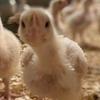Explore all the information on
Poultry drinking water
Water is a critical nutrient that receives little attention until a problem arises. Not only should producers make an effort to provide water in adequate quantity, they should also know what is in the water that will be flowing through the water lines to be used in evaporative cooling systems and consumed by the birds. Water is needed for bird consumption, reducing air temperature (including evaporative cooling pad and fogging systems) and facility sanitation. Broilers consume approximately 1.6 to 2.0 times as much water as feed on a weight basis. Water is a critical nutrient in bird metabolism and nutrition. From a physiology perspective, water consumed by the bird is used for nutrient transportation, enzymatic and chemical reactions in the body, body temperature regulation and lubrication of joints and organs. There is a strong relationship between feed and water consumption; therefore, water can be used to monitor flock performance.
What is Wet Litter? Wet litter in meat chicken production is a major concern due to its impact on animal welfare, flock health, environmental sustainability, and production efficiency. It arises when water addition (excreta, spillage) exceeds removal (evaporation), leading to litter moisture above 25 %, which compromises its cushioning and insulating properties. The causes are multifactorial, involving housing design, micro and macro environmental conditions, nutrition, health, and...
Comments : 0
Recommendations: 0
1. Introduction Mycotoxins are low molecular weight secondary metabolites produced under appropriate humidity and temperature conditions by filamentous fungi that pose serious risks to animal and human health [1]. With over 300 types of mycotoxins identified to date, mycotoxins can accumulate in various feeds and foods and make agricultural products unfit for consumption [2]. However, many mycotoxins remain poorly understood due to limited knowledge of their toxicokinetics and...
Comments : 0
Recommendations: 2
Recommended events
May 5, 2026
Canada - Alberta - Edmonton
In the rearing aviary, day-old chicks must have easy access to feed and water. The environment should offer an optimal temperature, appropriate lighting, and good ventilation. These conditions ensure that the chicks grow well, and their fluff transforms into well-developed feathers. As the chicks...
Comments : 0
Recommendations: 0
Dr. Mário Penz (Cargill) discusses the consequences of not managing water properly and the different factors to consider regarding its quality, during this Engormix interview....
Comments : 4
Recommendations: 9
Introduction Medication costs in the poultry industry (excluding vaccination costs) can account for up to 1% of the total production cost. This amount may not seem significant, however, when we talk about cash flow and investment from a business perspective, we can measure that it represents thousands of dollars, whose profitability often falls on the production unit manager and the person responsible for managing medications. In a layer hen business unit, for every 1 million layer...
Comments : 0
Recommendations: 0
1. Introduction Among agricultural industries, the poultry industry is prominent in many countries, since it supplies the majority of human protein[1]. Providing humans with energy, protein, and essential micronutrients, poultry contributes substantially to food security and nutrition globally. In addition to having short production cycles, poultry can convert a wide variety of agricultural byproducts and wastes into meat and eggs that are edible to humans [2]. Increasing...
Comments : 0
Recommendations: 0
Maria Fernandez Cuadrado (University of Arkansas) speaks about her research Impact of heat stress on hepatic lipogenesis in broilers: a comparison of low- and high-water efficient lines, presented at the IPSF 2025...
Comments : 0
Recommendations: 0
Giseli Heim (Trouw Nutrition) explains water acidification and its benefits on poultry performance in this Engormix interview during IPPE 2025 in Atlanta, USA....
Comments : 0
Recommendations: 0
Drinking behavior in poultry develops within the first couple days of life. When an open water source is provided, birds stick their beak roughly 10 mm into the water, use a scooping motion to collect water in their beak, extend...
Comments : 8
Recommendations: 1
1. Introduction Emerging biomarkers hold the potential to revolutionize veterinary medicine by enabling swift disease diagnosis, enhancing animal health monitoring, and optimizing welfare and production efficiency [1]. Nevertheless, the journey from biomarker identification to practical application is often fraught with challenges. Existing diagnostic tools for assessing gut health in poultry suffer from drawbacks, including invasiveness, subjectivity, labor intensiveness, and/or...
Comments : 0
Recommendations: 1
A poultry house controller's temperature sensors are, in a sense, its "eyes" enabling it to “observe” what is happening throughout a poultry house so it can accurately determine what equipment it needs to operate to maintain the proper environmental conditions throughout a house. As a result, a...
Comments : 0
Recommendations: 2
What is litter? Litter and its management are an essential part of bird management and ensuring bird welfare. This goes for broilers, turkeys, or laying hens kept on litter floors. Litter is a combination of the bedding used within a house combined with the excreta from the birds. Good quality litter provides...
Comments : 0
Recommendations: 0
Probiotics are included in the feed and administered continuously during the entire production cycle to maintain intestinal integrity and strengthen the immunity of the bird, thus reducing the need for repeated medication. Alternatively, water-soluble probiotics are often applied to quickly react to upcoming stress situations in the flock – but they can negatively impact the formation of biofilm in the water lines. For this reason, formulations that reduce the formation of biofilms...
Comments : 0
Recommendations: 2
The WVEPAH training program is designed for veterinarians and poultry professionals who wish to consolidate and refine their knowledge in areas such as pathology, nutrition, biosecurity, and epidemiology, among others. We are pleased to announce our upcoming course:
Module II: Commercial Layers at the prestigious Universidad Nacional...
Comments : 0
Recommendations: 2
Gonzalo Moreno (FENAVI Executive President) comments on the relevance of a sustainability program as a managerial tool, and how to better communicate its impact, in this Engormix interview....
Comments : 0
Recommendations: 0
Air is made up of appox. 21% oxygen. Air acts as a big reservoir for oxygen. Oxygen concentration in water is limited by its solubility:
Borewell/Tube well water has NO DISSOLVED OXYGEN?
“Normal underground water concentrations have little or no dissolved oxygen”
Ref.: Brian D. Fairehild and Casey W. Ritz
...
Comments : 9
Recommendations: 0


Updated Vitamin Requirements Across Species: Microvit® Nutrition Guide
Suggested link
INTRODUCTION Campylobacteriosis is among the most frequently reported bacterial foodborne infection in both the European Union (EU) and the United States, with Campylobacter jejuni as the major causative agent. In the last decade, the number of confirmed infections in the EU exceeded 200,000/year. Symptoms of campylobacteriosis include diarrhea, fever and cramps. Death rarely occurs, but complications can increase more than fivefold due to infections with antibiotic-resistant...
Comments : 0
Recommendations: 0
The first few days of life are some of the most important in chicks' lives. During this time, chicks start developing and set themselves up for the rest of their lifetime. The husbandry decisions made at this point can impact the birds' growth, development, health and welfare. This newsletter will focus on three important...
Comments : 0
Recommendations: 0
1. Introduction Animal welfare is a fundamental component of sustainability, agricultural development and food security. In order for a livestock system to be sustainable, it should be sustainable economically, environmentally and ecologically, and at the same time, it should be accepted ethically and socially [1–3]. Today, a product of animal origin is not considered sustainable unless the social demand for welfare of the production animals is satisfied [1]. Animal...
Comments : 0
Recommendations: 0
by Sam Shafer
We know that young geese benefit from warmer drinking water, but what is the optimal water temperature? Poultry scientists take a closer look
A new investigation into goose health suggests providing drinking water that is at least 18? (64.4?) may boost the activity of digestive enzymes, promote intestinal development, increase water consumption, and even increase goose eye temperature. Based on their findings, the...
Comments : 0
Recommendations: 0















.jpg&w=3840&q=75)




.jpg&w=3840&q=75)






.jpg&w=3840&q=75)











